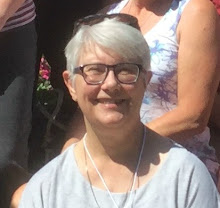This morning's Sunday Seminar was with Deborah Robson talking about Shetland fleeces and textiles.
It was a fascinating overview of the characteristics of Shetland fleeces - which are varied - and a peek at some of the textiles that Shetland is so famous for.
Shetland is definitely one of those places in the world I would love to visit, but being able to have a taste was greatly appreciated.
It was also heartening to hear that the Shetland textile traditions are not just being preserved, but are changing and growing with younger (than me!) practitioners exploring the crafts and keeping them not just alive, but living.
Deborah talked about a well known person who does the very important job of grading the fleeces, and how he now has a younger apprentice, ensuring that the quality of the fibres will continue to be assessed for spinners who understand what they want in a fleece.
In many ways I thought about my own stay upon this earth and how we need to do the same in weaving. I have found the Olds master program helpful in finding like minded students who are willing to dig deep into the craft and keep it alive and living - growing, changing, evolving.
During this time of living pandemically, being able to reach those people via Zoom has been enormously satisfying to me. While I do love to teach in person, being able to continue the passing on of knowledge remotely means that I can continue to reach out and actually touch many more people than what I can do in person.
For anyone interested in these Zoom presentations, each one can be done in about 2 hours and given as a guild presentation, via Zoom. Or I can add more to the Saturday Study Group on Facebook. The third presentation is coming this Saturday, the first two remain accessible via private link. If anyone is interested, send me a message on FB and a friend request, and I can add you. Or, if you know someone already in the group, they can add you.
In the meantime Deborah says she is working on more books. I've asked to be notified when they are ready so I can spread the word.




2 comments:
In Australia, people who grade fleeces are called Wool Classers, and you can study it at TAFE - unfortunately, I'm not sure of the equivalent in the US.
These days, it's not uncommon for women who spin and live on a farm to do the course so they can class their own wool clip (all the wool shorn on the farm), and understand more to enhance their own spinning knowledge. In some areas, it's common to rotate sheep and wheat - they often have a clover underlay grown under the wheat to fix nitrogen in the soil (Australian soils are mainly very, very old and depleted of minerals over billions of years), and for sheep feed.
Great blog I enjoyed rreading
Post a Comment